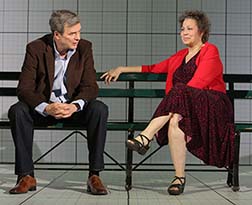|
"Love and Information" is
a Caryl Churchill quirky disappointment.
"Love and Information."
Written by Caryl Churchill; directed by James Macdonald.
New York Theater Workshop, in association with the Royal Court Theater
at the Minetta Lane Theater, 18 Minetta Lane, New York City.
800-982-2787, http://www.nytw.org/love_and_information_info.asp.
Opened Feb 19, 2014 ; closes April 6, 2014.
Reviewed by Lucy Komisar Feb 22, 2014.
Caryl Churchill is one of my favorite playwrights ("Serious Money,"
"Top Girls") and a major dramatic commentator on the feminist
and the political. I am therefore sorry to report my disappointment
in her latest work, "Love and Information." It's a pastiche
that seems thrown together from notes that never got turned into a
script.
The play occurs in a black box lined with graph paper. It pretends
to be a commentary on what currently is going on in our technological
lives. But it is pedestrian compared to what she has done before.
Much of it is incomprehensible.
Let's start with the best. A couple (John Procaccino and Randy Danson)
meets after years, but their memories don't sync. Neither remembers
the other's recollections. What's left of their romance is just vague.
It's called "EX." It's worth quoting in its entirety, because
it is very clever Churchill. Shows what she could have done. And fans
will enjoy it.
"I'm glad we've done it, just to see
so am I
after all these years
because it was very important at the time, it's been very important
it has for me, all my life, very important
so never to have seen each other again would have been
it would have been impossible
it would have been sad anyway.
 |
| John
Procaccino and Randy Danson in 'Love and Information.' Photo by
Joan Marcus. |
You remember the Italian restaurant?
no, yes, on the corner was it?
with the bushes outside?
no, I'm mixing it up with
I can see the waiter now
no, I can't get the waiter
the waiter with the mustache who always smiled so much when we came
in.
I used to have spaghetti carbonara and you had clam sauce.
I can't remember eating, no, I was too busy looking at you probably.
I really loved you then.
I loved you.
I always remember you standing in that field
I wonder where that was, was it
all the buttercups.
I've got a really clear picture of you running ahead of me down a
street. We were running for
a bus I think.
Do you remember that hotel, we took a room for a couple of hours in
a hotel, there was green
wallpaper and we stood there kissing.
I remember the first time
no, that's got overlaid by so many other times, I can't, I remember
once by a river, we were
practically on a trail where the hikers
the kitchen, the kitchen at your friend's house
which friend?
I never knew your friends' names
was it Chris? Terry?
I don't know, you remember the kitchen?"
I might if I knew which house. Did we do it in a kitchen?
Behind the door. There was soup on the stove.
I remember us just looking at each other.
The time in the street, we just stopped.
I was thinking more a time when you were sitting on the side of the
bed.
Was that early on or near the end?
Near the end I think. Do you know the time I mean?
I sometimes go past that coffee shop.
Which one?
The one where we kept trying to say goodbye.
 |
| Maria
Tucci and John Procaccino in 'Love and Information.' Photo by
Joan Marcus. |
I think I've blotted that whole day out.
We were really happy.
Or sad, we used to cry.
Did we?
Sometimes."
It's very funny. It conjures up the spirits of Nichols and May. I
quote the whole bit, because I thought it so good.
Alas, nothing else in this play comes close.
Two people in their 50s (Maria Tucci and John Procaccino), in a vertical
bed covered with a white spread, can't sleep. She says I can't sleep,
I think I'll get up and go on Facebook. This is funny?
Other people don't remember the past without seeing videos of it.
In a bit with uninterested kids, a woman says, "I'm your mother,
she's your grandmother."
A guy is in love with a virtual woman, a robot. They are on exercycles.
He says, "She loves me."
This is cartoon stuff. Many skits are not close to being interesting
or funny or with a point. And if you have to sit there trying to figure
out what she means, beyond the boring obvious — yes, some people
talk to their computers and cell phones more than to other people
– it isn't working.
I don't comment on the actors because they all did their jobs, but
none of them were memorable.
If this wasn't Caryl Churchill, no one would take it seriously.
Visit Lucy Komisar’s website
http://thekomisarscoop.com
|



